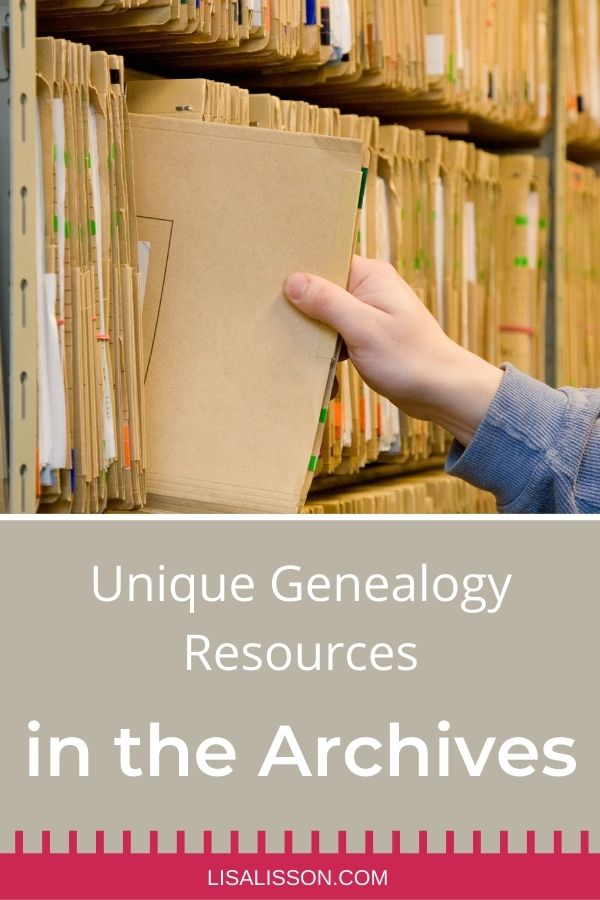
11 Unique Genealogy Resources You May Have Missed in the Archives!
Do not miss out on finding your ancestors at the archives. Explore unique record collections genealogists often overlook.
Are you missing out on searching important genealogy record collections in the archives?
Not sure?
You are in the right place, because we are going to explore 11 types of records and record collections found in the archives that you probably have never even thought about.
Yep, we are exploring “out of the box” genealogy resources in the archives. [It’s my favorite kind of research!]
What Your Archives Research is Missing
It’s no surprise that genealogy researchers find themselves in a state or local archives at some point in their research. The trip may be a one time marathon research session requiring significant travel. Or the research may be able to make frequent research to seek out their ancestors.
Researchers are familiar with archive records and use them regularly – deeds, vital records, county court records, wills/estates, and even tax records. But if the research process stops there, you are missing out on other record collections that could benefit your research.
The examples I share are from the State Archives of North Carolina. While I realize not everyone has NC ancestors, I encourage you to use the list as an inspiration when searching the state archives where your ancestors lived.
- Transcription Projects – Transcribe NC – This is an opportunity to volunteer and transcribe records. I highly recommend this as a way to improve your skills at reading old handwriting and become a better transcriber. It is also a chance to become familiar with record sets. Examples of collections in the project include Military Diaries, African American Education and Colonial Court Records.
- Maps – Maps of all types can be found at the state archives and many can be found in their online collections. Do not overlook early maps, topographical maps and even postmaster maps. All have valuable information.
- Family Photo Collections – Archives have photo collections of groups and families. An example would be the Badger and Associated Families Photograph Collection. Remember, many of an archives photographs may not be online such as this one, but accessing the finding aid ahead of time saves research time once you get to the archives. Alternatively, reach out to an archives to determine how to view a family photo collection of interest that is not online.
- Photographs from Businesses – An ancestor’s occupation was an important part of their life. Include a search of the photo collections for businesses. You just might find your ancestor at work.
- Records from Foreign Collections – These collections generally span the year 1585 – 1783 and generally contain records relating to North Carolina history. Once example is the Scottish Records for the Church of Scotland. It’s a fascinating collection of records (and one I need to explore for my own research!).
- Bible Records – Many state archives have ongoing Family Bible collections and/or transcription projects.
- Diaries – Tucked in among the family record collections or in an archives special collections are diaries. Even if the writer is not an ancestor, if he/she was in an associated family, take a look. Your ancestor’s family may be mentioned its pages.
- Sorority Records – An example of this type of record collection would be the Alpha Kappa Alpha Sorority that contains scrapbooks, histories, photographs and more.
- Freemason records – This collection includes membership applications (1806 – 1807), lodge proceedings and more.
- Club records – Our ancestors enjoyed joining clubs like the Olla Podrida Club that was a women’s social and literary club. The collection contains yearbooks. newspaper clippings, meeting minutes and more from 1908 into the 1990’s.
📝Genealogy Tip 📝
If something was important to your ancestor such as a club, society or their occupation, then it is important to you as a genealogy researcher.
This is not a complete list of the types of records available, but a sample of some of the interesting record collections I have come across. The nice thing is some are digitized and for some it’s just the finding aid that is digitized. For those collections not online, a trip to the archives is needed to view them. Of course, knowing what the archives have and reviewing the finding aids online saves you time at the archives freeing up more actual research time. That’s always a good thing.
The Next Step in Your Archives Research
Now that you have an idea of the types of records you might be overlooking in your research, it’s time to start exploring the state archives where you research.

Explore their website and any online databases they have.
If you are looking into the clubs your ancestor may have been a part of, but are not sure of the club records in your archives, talk to the archivist. Let them know what you are looking for. They can help you and also recommend other collections of interest.
Was your ancestor in an occupation that kept records? [Alas, most of mine were farmers….] Add occupational and business records to your list.
Ponder what daily life was like for you ancestor. What was important to him or her? As you learn more about your ancestors, you will start to identify those “out of the box” resources to search.







